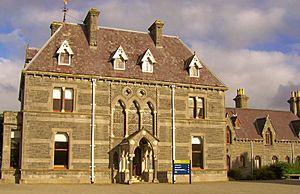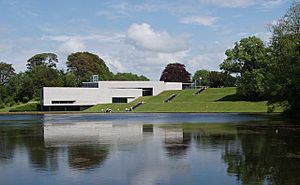National Museum of Ireland – Country Life facts for kids
| Ard-Mhúsaem na hÉireann – Saol na Tuaithe | |

Turlough Park House, adjacent to the Museum.
|
|
| Lua error in Module:Location_map at line 420: attempt to index field 'wikibase' (a nil value). | |
| Established | September 2001 |
|---|---|
| Location | Turlough Park, Castlebar, County Mayo, Ireland |
| Type | National museum |
| Visitors | 100,000 |
| Architect | Thomas Newenham Deane, Dublin |
| Public transit access | Castlebar railway station Bus Éireann routes: 52, 60, 440, 456 |
| National Museum of Ireland network | |
|
|
The National Museum of Ireland – Country Life is a special place to learn about how people lived in rural Ireland. It is located in Turlough village, about 8 kilometers (5 miles) northeast of Castlebar. This museum opened in 2001. It is the only national museum in Ireland that is not in Dublin.
The museum shows what life was like for Irish people in the countryside. It covers the years between 1850 and 1950. You can see displays about homes, nature, old jobs, and how people worked on the land and water. The museum is set in the beautiful grounds of Turlough Park House.
Contents
History of the Museum
Turlough House: A Grand Home
The main building, Turlough House, was designed by Thomas Newenham Deane. He also designed another part of the National Museum in Dublin. The house was built between 1863 and 1867. It was once owned by the Fitzgerald family of Turlough.
Becoming a Museum
In 1991, the local council bought the house and its land. The house was carefully fixed up. A new museum building was built next to it, hidden in a hillside. The Country Life Museum first opened its doors in September 2001. The upstairs of the old house is now used for offices. The downstairs rooms are open for everyone to explore.
Exploring the Gardens
The lovely gardens of Turlough House are now looked after by the government and local council. You can find many interesting things there. There is a vinery, which is a special greenhouse for growing grapes. You can also enjoy many walking paths and terraces. There is a sunken garden and the old ruins of an even older house. Part of the Castlebar River flows through the grounds. It has an artificial lake with islands and a round tower.
What You Can See: The Collection
The museum has a huge collection of items from Irish country life. There are about 37,000 objects in total! Only a small part of this collection is on display at Turlough Park. Many items are stored there, and larger machines are kept at other locations. The museum also has a library and archives. You can ask to see items not on display if you are doing research.
Special Exhibitions
The museum has both permanent displays and temporary shows. These are set up by different themes across four floors.
Some exciting past exhibitions have included:
- Michael Davitt Exhibition: This show honored the life of Michael Davitt. He started the Irish National Land League. This group helped farmers get fair treatment for their land.
- The Cross of Cong: This is a very old and important cross from the 12th century. People believed it held a piece of the True Cross. It is one of Ireland's most valuable medieval treasures. The cross was kept in County Mayo for a long time. In 2010, it came back to the Museum of Country Life for one year.
- Power and Privilege: This exhibit showed photographs from 1858 to 1922. It gave a glimpse into the lives of rich families and their servants in big Irish houses.
- The Coggalbeg Hoard: This was a collection of ancient gold jewelry from the Bronze Age. It was found in a bog in 1945. The gold was later stolen from a pharmacy safe in 2009. Luckily, it was found again in a dumpster!
Visiting the Museum
The museum has its own parking area. There is also a shop where you can buy souvenirs. If you get hungry, there is a café. The museum is open on Sundays and Mondays from 1 PM to 5 PM. From Tuesday to Saturday, it is open from 10 AM to 5 PM.
How the Museum Works
The National Museum of Ireland, including the Country Life Museum, has faced some changes in its funding over the years. However, the museum remains open and continues to welcome visitors. There is no entrance fee to enjoy the museum.


